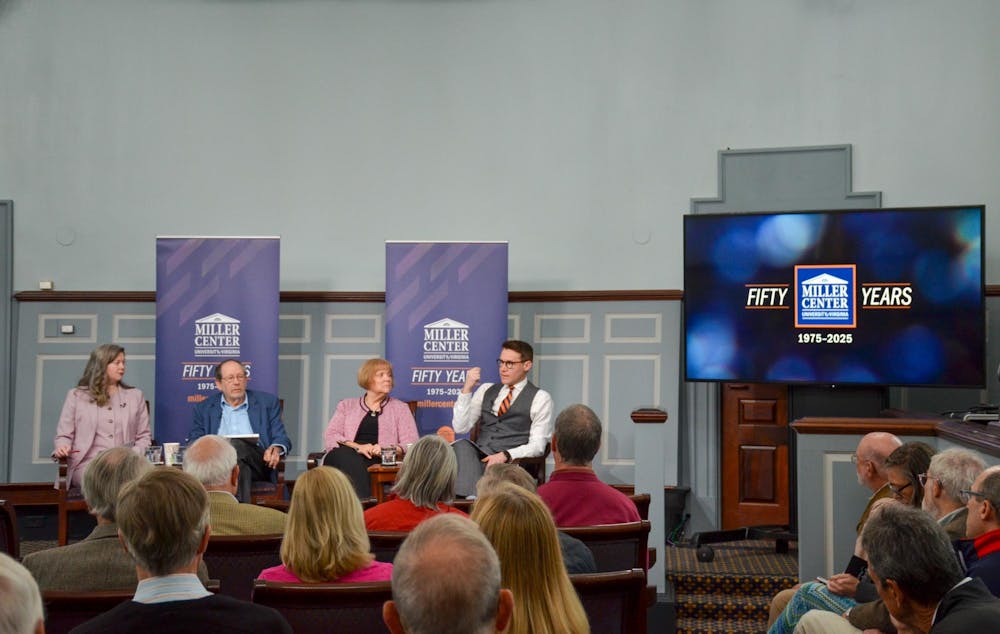The Miller Center brought together three University faculty panelists and one moderator Friday to provide insight into the sustainability of the Trump administration's economic approach, underlying historical precedent and relevance regarding recent tariff decisions. The event, held Friday, was presented by the Miller Center’s Project on Democracy and Capitalism.
The Miller Center is a nonpartisan affiliate of the University that aims to provide insight, especially on the presidency, and advance democratic institutions. Its series on Democracy and Capitalism explores the interconnectedness of free-market economic systems and self-government. Past events in the series include a comparison of Hamiton and Jefferson and a dive into artificial intelligence’s impact on democratic capitalism.
Hannah Knox Tucker, Miller Center nonresident faculty senior fellow and assistant professor at the Copenhagen Business School, moderated the conversation. She provided context for the ensuing discussion on President Donald Trump’s recent tariff decisions. The President introduced sweeping tariffs, pausing them for many trading partners Wednesday while increasing them on China. The average effective tariff rate for U.S. imports is now 27 percent, according to Tucker, which is the highest average tariff rate since 1903.
Scott Miller, director of the Miller Center’s Project on Democracy and Capitalism and lecturer and research associate at the Darden School of Business, said that due to the tumultuous nature characterizing the recent tariff decisions, one cannot predict how tariffs will reshape global order without knowing the time period they will last, which is unclear right now. Miller said that tariffs are not an isolated economic policy but rather a means to political ends, suggesting their duration depends on capitulation by opposing countries.
“We could make pretty resolute assumptions of what tariffs would do at a given rate held over a specific period of time,” Miller said. “But … that has not been the trajectory over the last three months or so — they have been instituted, taken back, put back on, increased, decreased, put back on [and] taken off.”
Margaret Foster Riley, Dorothy Danforth Compton Professor at the Miller Center and professor at the University’s School of Law, School of Medicine and Frank Batten School of Leadership and Public Policy, said she sees two viable ends to the current tariff debacle — either the Trump administration gets its way or China comes away as the winner. Riley was in Shanghai in January, and she said at the Center for American Studies they shared their preparation for tariffs and response plans. According to Riley, China was prepared to meet U.S. tariffs with a strong opposing force, and they have followed through with this intention.
“If you look at China's resurgence, which we're giving them a door to open with, they then start picking off not just the sort of neutral parties in the world, but our own allies economically,” Riley said. “And China could actually do it alone. We can’t.”
Sidney Milkis, Miller Center’s White Burkett Miller Professor of Governance and Foreign Affairs and professor of politics, added that the problems and dangers with China are exacerbated by the U.S.'s treatment of surrounding ally nations.
Recent talks of the tariff decisions have revolved around the idea of fairness and to what degree leaders of nations feel “ripped off” or taken advantage of by current tariff policies, according to Miller. He said this has fostered the perception of implementing tariffs as a way to fight for the people of the country against a world that is not granting proper dignity and rationality.
“[Recent tariff policy] is meant to instill this sense of, okay, I am fighting for you, against the world which is aligned against you. I am fighting to restore fairness,” Miller said. “That is good political messaging of solidifying a political base.”
Specifically in relation to China, Miller said it is absolutely valid to identify Chinese practices that differ from the rest of the commercial world. However, he said even considering China’s unfair policies, it is tactically unsound for the U.S. to also hinder its relationship with surrounding countries by raising tariffs on allied nations.
“The last thing you want to do is isolate yourself and say, well, yes, China is being unfair, but we're going to zap all of the allies that we had around them and then leave them open to Chinese [influence],” Miller said.
Considering recent tariff policy, each panelist weighed in on whether an economic recession looms. Milkis expressed concern specifically over the bond market's recent fall, stating that the country is in “serious trouble,” particularly given the deficits. According to Milkis, the bond market shakiness motivated Trump’s decision to impose a 90-day delay on tariffs for all countries with the exception of China.
Riley shared Milkis’ alarm over the bond market responding to the tariffs imposed, and she added that low public confidence could drive a potential recession, as it has in historic recessions.
“When I saw the bond market responding [to the tariffs], I had a slight psychotic break,” Riley said. “This is an administration that thrives on chaos, but I'm not sure that consumer confidence thrives on chaos, so I think that's where I really have had concerns.”
Miller cited forecasters who give over a 50 percent chance of recession and said that he finds this prediction to be “undoubtedly true.”
Milkis said this recession would be enabled by a presidency that is vested in too much power. According to Milkis, no president has embraced this power like Trump, which poses unique threats to a system veering towards an elected monarchy.
“President Trump … is subject to changing his mind. Any individual on their own, I think, goes against the idea of a republic [and] pure democracy,” Milkis said. “This kind of personal rule — certainly Trump did not begin, … [but] he's an accelerator [of this] danger that really threatens to undermine the foundation of republics.”
Speaking to the lawfulness of Trump’s actions, Riley said that courts have mostly been responding to procedural questions surrounding executive orders and tariffs, and she expects that some of the more relevant cases will not be resolved for another three to four years.
Milkis said the administration has imposed these tariffs unlawfully, using the International Emergency and Economic Powers Act of 1977, which delegates responsibility of imposing tariffs to the president and mandates that there must be an emergency for the president to exert his powers. According to Milkis, the Trump administration has ignored this stipulation of the policy.
“Were [the economic problems] so severe when the President was inaugurated that he had to pursue this kind of draconian power policy?,” Milkis asked. “The administration has made no effort to explain why the nature of the crisis would force them to do this.”
According to Riley, although aspects of Trump’s presidency have precedent in other points in history such as Andrew Jackson’s sovereigntist impulses, she said that the U.S.’s role as a bully on the global stage has never been seen to this extent. Riley said that it does not make sense to her that this bullying should result in success.
Fourth-year College student Nikita Jordan said she attended the event hoping to further integrate herself in the current political moment as she prepares to enter the workforce. Until today, she said she had never really considered economic policies as forceful political means. She appreciates that the University has resources like the Miller Center to hear from experts and aid students in forming their own opinions.
“Going through school, I feel like I was so isolated from politics,” Jordan said. “As I'm getting older and going into the workforce, I realized that it's very important to be in tune with exactly what's happening now.”
Zooming out of current policy and looking to the future of democracy and capitalism, the panelists all agreed that the two forces are inseparable and thrive on each other’s support. Both Miller and Milkis said the rule of law is entwined in both of these concepts and is essential to their flourishing.
“To perpetuate and solidify American capitalism for the future, statistically, the most important thing we should concentrate on is the perpetuation and solidification of rule of law,” Miller said.







